If you’re outdoorsy, chances are you can’t just sit back at home and spend your off-day watching TV or playing board games with your family and friends. You also believe in the old adage, “time well-spent leads to a life well lived.”
And to live a good life, you will try to keep your body and soul healthy. Outdoor activities such as cycling, jogging, gardening, or even brisk walking appeal to your heart the most.
But you also love nature and experiencing all the things that this earth can offer.
So, you begin to do your own research and start to become interested in more advanced outdoor activities such as hiking and camping. But after giving some thought to them, you aren’t quite sure which one suits you best.
In fact, between hiking and camping, which is better?
If you’re looking for cheap outdoor activity that doesn’t require you to stay outside for more than a day, then hiking would be your best option. But if you prefer quality time out in nature with your family or friends, then camping definitely would suit you best.
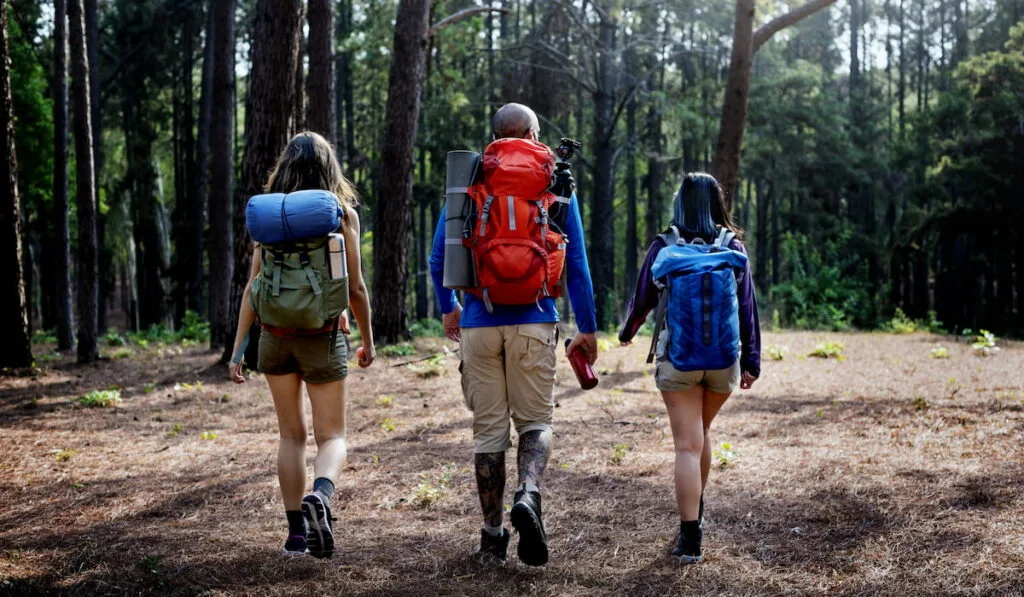
Luckily, you’ve stumbled across this article because we have outlined all the information you should know about hiking and camping.
Without further ado, let’s start with all the things you should know about hiking and camping before we make an in-depth comparison between these two activities.
Table of Contents
What Is Hiking?
Hiking is one of the most popular recreational activities and consists of a long walk out in nature.
Unlike a normal walk in the park, hiking usually takes place on a trail deep in a forest, at national parks, or even off a trail in a secluded region.
Professional and avid hikers can easily navigate through more challenging routes, such as mountainous trails and hillsides.
In other places such as the United Kingdom and Australia, hiking is known as hillwalking, fell walking, and bushwalking.
What Is Camping?
Camping is an outdoor activity that requires participants to stay overnight or a few days outside in a tent.
This type of recreational activity requires basic gear and equipment such as a tent, flashlight, cooking pots, matches, and much more.
Unlike hiking, camping can be done in different places such as forests, hillsides, near the river, or even just in your backyard. However, this activity will require you to fork out some money to purchase all the gear.
Serious campers are prepared to invest more to get better equipment that could maximize their experience during their stay.
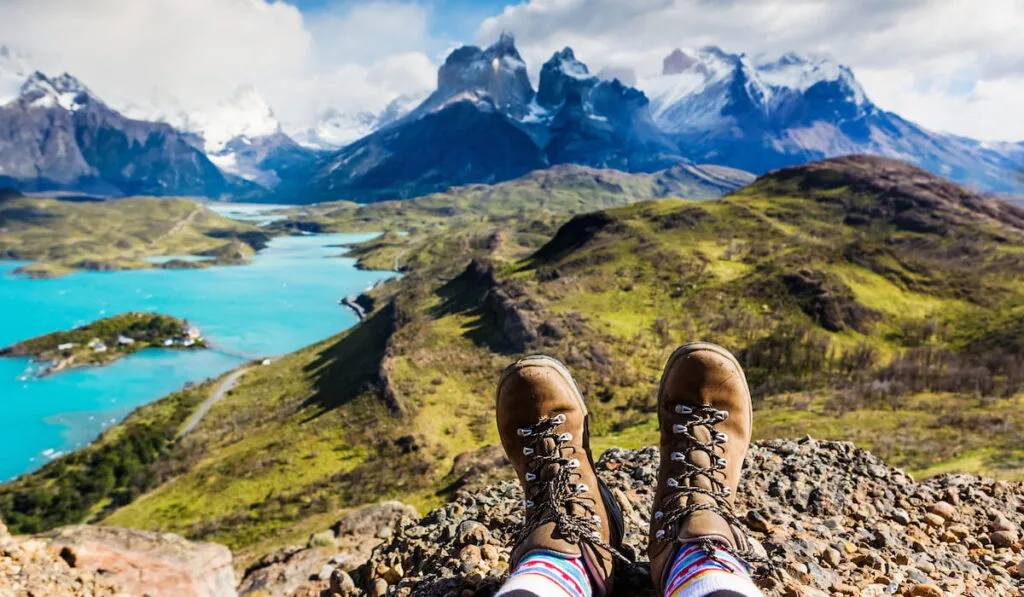
What Are the Pros and Cons of Hiking?
When it comes to outdoor activities, we can’t overlook that they come with benefits and challenges.
When hiking, it can be quite fun to roam a trail you have never discovered before. But it also can be quite challenging if you aren’t fully prepared, both physically and mentally, to face the harsh terrain.
There are a few benefits and challenges that you should consider for going out for a hike.
Benefits
Promotes Good Health
It goes without saying that any type of activity that moves all your limbs is good for your health.
With hiking, you will continuously move all your muscles to walk or make slight jumps on elevated terrain. The more challenging the trail you are about to explore, the more rigorous your hiking experience will be.
Aside from getting your blood pumping, hiking can increase your breathing rate, which leads to a better fitness level. Your chances of getting illnesses due to a sedentary life will also decrease.
Flexibility
There are no fixed rules on when you should go for a hike. It all depends on your preference and availability.
In fact, hikers can be divided into a few categories: day hikers, overnight hikers, section hikers, and thru-hikers.
- Day hikers usually go for a hike during the day.
- Overnight hikers might stay in a camp overnight or for several days.
- Thru-hikers are usually avid hikers that love to complete the whole hiking trail during their trip.
- Section-hikers usually select a specific section from the overall trail for their hike.
Peace of Mind
When you are physically fit and healthy, your mental health level will directly increase in proportion to how healthy your lifestyle is.
Hiking lets you explore and enjoy nature. Being out in the wild, you can take a break from the hustle and bustle of life, especially if you live in a big city.
Peace of mind is something that is hard to come by. But you can achieve it through hiking.
Additionally, enjoying green scenery can also promote good eyesight because green is considered one of the soothing colors for the eyes.
A Cheap Alternative to Therapy
If you can’t afford to see a therapist, consider going for a hike to calm your mind and soul. All you need is a car or public transport, your preferred location, a hiking outfit, and a bottle of water.
Furthermore, hiking can also train your mental toughness.
For instance, if you manage to finish walking down the trail within a certain time limit, it will influence your mental resilience and the way you discipline yourself to push through, no matter how tired you are.
At the same time, you will learn your strengths and weaknesses and how to navigate them in times of need.
Scenic View
Living in a concrete jungle has its own pros and cons. We can’t deny that big cities offer many opportunities you can’t get when living in suburban or remote places.
However, there is one thing you can’t get in a city: beautiful nature. Hiking can become one of the best ways to explore the jewels of the earth.
You can take photos of your hiking moments and every scenic route you pass through and even make a video of the calming atmosphere in the forest.
Certain beauties in life are totally free but only accessible to the ones who can find them.
Challenges
Risk of Physical Injuries
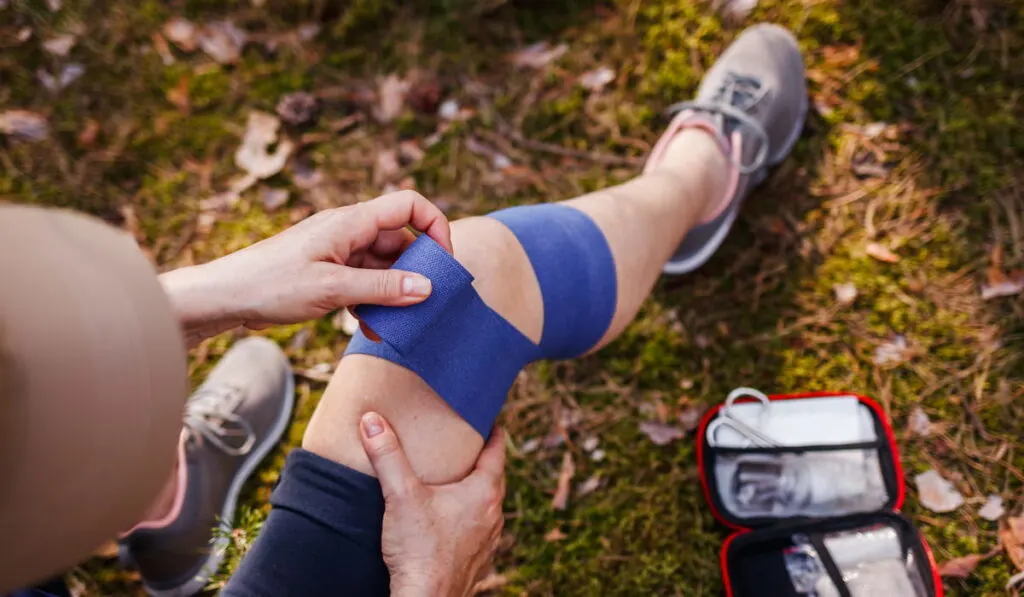
Any rigorous physical activities possess an injury risk. Hiking is one of them.
You can fall on the trail, slip on slippery rocks and hurt your feet, or even get scratches or bruises from tree branches.
Not to mention, some muddy trails aren’t suitable for people with weak feet or low core strength.
You can also sprain your ankles if you aren’t properly fit to explore the trail. Hence, it would be wise to hike on a much easier route before moving on to a more advanced trail.
Uncertainties in the Wild
There are many things we can’t predict once we are away from our cities. If you explore deep trails alone, you must be prepared to face any events that could happen.
You might experience torn shoes, poor cell phone signals, broken GPS, running out of drinking water, getting lost on the trail, and wild animal attacks.
For beginner hikers, hiring professional hikers who can guide you and navigate the trail is better. They know how to deal with all these emergencies if anything happens.
Inconsistent Weather
When hiking, you are at the mercy of mother nature.
There are days when the sun shines bright, and the air is refreshing. But when inclement weather arrives, no matter how experienced you are, you have to avoid walking on hillsides, mountainous routes, and rocky tracks.
Not Suitable for Small Children
Although you have experience hiking up many hills and mountainous trails, there is no telling when accidents could happen.
So if you have small kids, hiking can be quite dangerous. Some kids aren’t even fit enough to hike up hillsides. You can carry them on your back, but indirectly, it will take a toll on your own body and energy.
Of course, you can take your family for a walk on a short or less challenging route.
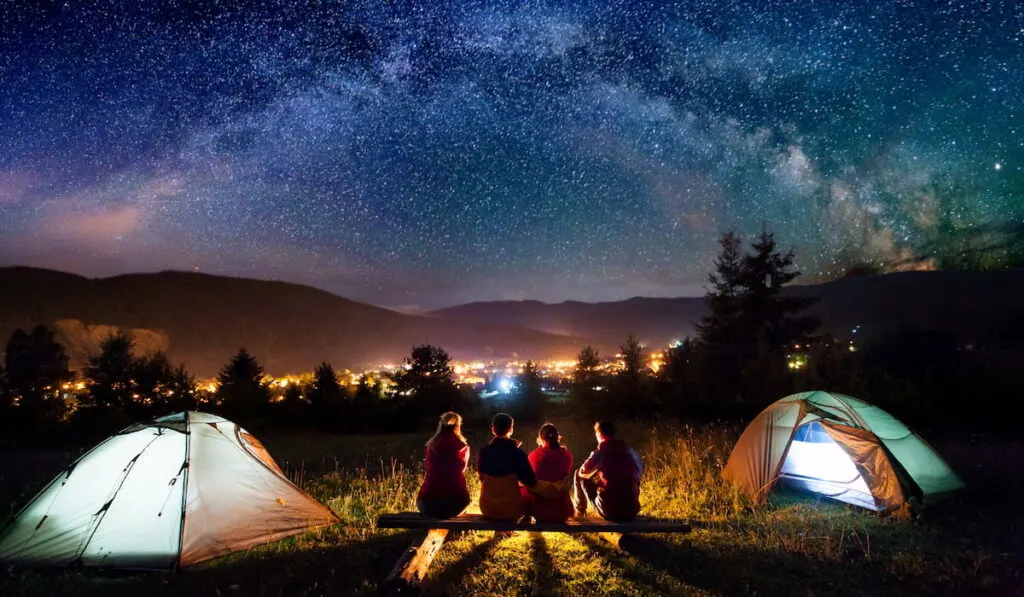
What Are the Pros and Cons of Camping?
Although camping differs from hiking, this activity can still benefit you in many ways. But it also comes with its own challenges.
Here are some of them:
Benefits
Promotes Better Mental Health
Nature has its own way of making us feel calm and content.
When you surround yourself with tall trees while breathing in the fresh air, it can instantaneously reduce your stress and cortisol levels.
And if you camp near the river, you can enjoy the sound of water running down the riverbed. As your stress level decreases, you will feel less anxious.
You will now be in control of your moods, and getting a good night’s sleep won’t be much of a problem.
Additionally, being outdoors will also expose you to enough sunlight.
Sunlight makes you sweat, which eliminates toxins from your body. Also, sunlight is a natural source of vitamin D, which can regulate the production of melatonin, promoting quality sleep.
Makes You Physically Active
Although camping isn’t as rigorous as hiking, you will still need to walk to the campsite. This is true, especially if the site is located away from the main road.
Moreover, you will also need to carry a heavy load on your back, including all the necessary gear and supplies. Not to mention, there are tons of other activities that you can do once you arrive at the campground, including fishing, canoeing, swimming, trekking, and many more.
Develop Survival Skills
Believe it or not, camping will teach you many essential skills you can’t find online.
Although you may have heard how avid campers survive in the woods or have watched a few videos on survival guidelines, there is no better way to implement all that theory than by practically doing it yourself.
When you camp, you will learn how to cook outdoors, set up a tent, start a fire, fish and hunt for food, differentiate between edible and nonedible plants, and many more.
Additionally, the better you get at figuring things out in the wild, your problem-solving skills will improve.
Strengthen Your Relationships
If you’re looking for quality with family and friends, then consider a camp trip to the nearest hot spots or campgrounds.
Unlike hiking, you don’t have to worry about the safety of your children because all your activities are usually centered in one spot.
You can also unplug from all the devices and technology and focus on activities that you can do without having to search for nearby Wi-Fi.
There are so many things that you can focus on without any distractions from the outside world.
Better Appreciation of Nature
There is no better way to teach our children how to value the environment and nature than taking them out for a camping trip.
They have to be in the actual place to really experience what it feels like if all the forests perish and are gone from the face of the earth.
Our children will be the ones who will inherit this earth. So instilling good values and developing environmental awareness early in their life is important.
Challenges
It Can Be Quite Costly
Camping generally requires you to invest some money for high-quality camping gear.
You’ll need tents, waterproof mattresses, sleeping bags and pads, headlights, flashlights, portable stoves, and much more.
Depending on the type of camping you prefer, the amount of money invested will also vary.
For instance, RV or van camping will require you to fork out a large sum of money for the vehicle compared to primitive camping and tent camping.
You will also need good insurance coverage just in case emergencies or injuries happen during your trip.
Risk of Bad Weather
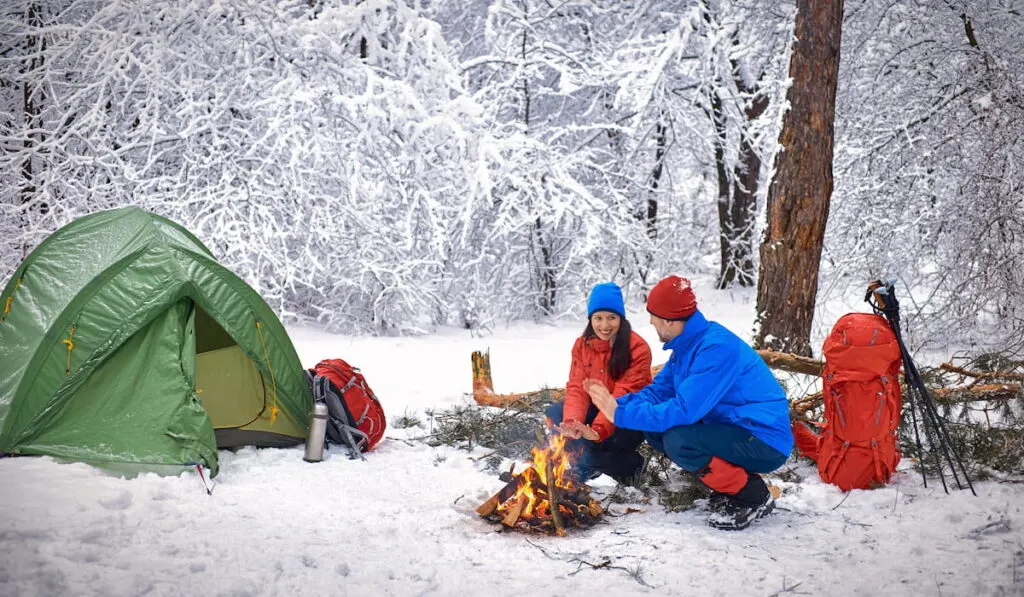
Camping isn’t all rainbows and sunshine.
On a good day, you can do many activities that don’t require you to be vigilant with the weather. But you will experience heavy rain, strong winds, and freezing nights during cold and wet seasons.
Of course, you can opt for better places to stay, such as chalets and wooden cabins. But that literally will take away the joy and experience of being out in the elements.
Having to Book the Campsite Early
Unless you know how to navigate your way in the forest and find the best spot to camp, then you will have to reserve your spot early at any campsite. This is because most campsites are full of visitors from different places during the holiday seasons.
You also don’t have much privacy when staying in popular campgrounds.
Bad hygiene, littering, noise, or even lack of space are some common issues you may have to deal with.
Risk of Injuries and Animal Attacks
Similar to hiking, camping possesses the same risks.
The only thing that separates these two activities is that when hiking, you have the flexibility to move, run, or not stay in the same place.
But with camping, all your gear and equipment are set up in a designated spot. So whether you like it or not, you must be fully prepared to deal with all the uncertainties of doing outdoor activities.
Final Verdict
So what should you choose? Hiking or camping?
To be honest, the answer is totally subjective and up to your own preference. If you’re looking for cheap outdoor activity that doesn’t require you to stay outside for more than a day, then hiking would be your best option. But if you prefer quality time out in nature with your family, then camping definitely would suit you best.
Resources
- https://askanydifference.com/difference-between-camping-and-hiking/
- https://restlessbackpacker.com/trekking-vs-hiking-vs-camping/
- https://en.wikipedia.org/wiki/Hiking
- http://ihikebc.com/Top5ReasonsToHike.htm
- https://environmental-conscience.com/hiking-pros-cons/
- https://environmental-conscience.com/going-camping-pros-cons/
- https://www.breobox.com/blogs/news/pros-cons-of-camping

